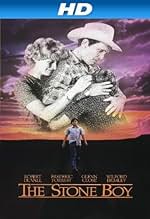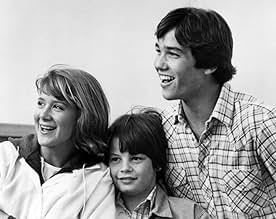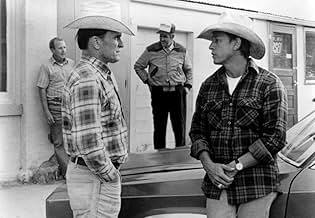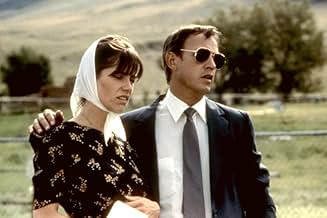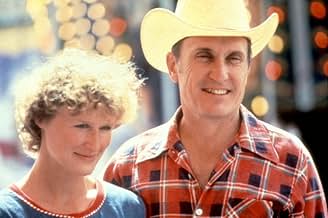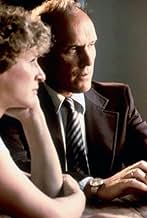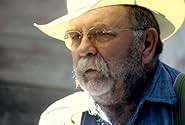Füge eine Handlung in deiner Sprache hinzuA Midwestern farm family faces major emotional adjustment after a tragedy results in the death of an older brother.A Midwestern farm family faces major emotional adjustment after a tragedy results in the death of an older brother.A Midwestern farm family faces major emotional adjustment after a tragedy results in the death of an older brother.
- Auszeichnungen
- 2 Nominierungen insgesamt
Susan Rinell
- Nora Hillerman
- (as Susan Blackstone)
Empfohlene Bewertungen
A family in rural Montana has their lives ripped apart after their youngest son Arnold (Jason Presson) accidentally shoots and kills his older brother Eugene (Dean Cain). The parents (Robert Duvall and Glenn Close) don't know exactly how to handle the situation afterwards as the boy seems to have no emotion about it, so it is up to his grandfather (Wilford Brimley) to help him make sense of it all.
This is perhaps as low key a drama as you could find. Director Christopher Cain (stepfather of Dean) allows for everything to unfold in a realistic fashion with nary an opportunity for over-the-top theatrics (Frederic Forrest does provide some as Close's brother). There is also a wonderful score by James Horner and beautiful cinematography by Juan Ruiz-Anchia. Presson is quite good as the lead and he would go on to be the kid no one can remember from Joe Dante's Explorers (1985). Linda Hamilton as has a small role as a lady the boy encounters on a bus. Duvall, Close and Brimley would also appear in The Natural released a month after this.
This is perhaps as low key a drama as you could find. Director Christopher Cain (stepfather of Dean) allows for everything to unfold in a realistic fashion with nary an opportunity for over-the-top theatrics (Frederic Forrest does provide some as Close's brother). There is also a wonderful score by James Horner and beautiful cinematography by Juan Ruiz-Anchia. Presson is quite good as the lead and he would go on to be the kid no one can remember from Joe Dante's Explorers (1985). Linda Hamilton as has a small role as a lady the boy encounters on a bus. Duvall, Close and Brimley would also appear in The Natural released a month after this.
The Stone Boy is a tragedy of Midwestern stoicism in the face of inconsolable grief. Arnold accidentally shoots his brother and is frozen out by his family, with the exception of his grandfather. The process for everyone is painful to watch, but handled very quietly. I was very reminded of Tender Mercies, another great Robert Duvall film. It is drama at its best and a film I recommend highly.
It's hard to say sometimes why exactly a film is so effective. From the moment I first came across "The Stone Boy", something told me it would be a great film. In spite of that, it seemed very unlikely that I'd ever have the opportunity to actually see it for myself. Then, one day, while looking through the online catalogue of my local library, I saw that they had recently purchased the DVD release of this film. Which I'm extremely glad for, because the cinematography is of a stunning depth and quality that an old VHS copy could never replicate.
And speaking of the cinematography, I must single it out as far and above the most stunning aspect of this film. As a photographer who pursues very nearly the exact visual style portrayed in "The Stone Boy", I'm a firm believer in the fact that a great cinematographer can almost single-handedly carry a film. Here, he has a lot of help from an extremely talented cast, and a director who understands perfectly what the story needs. But to have Juan Ruiz Anchía behind the camera makes virtually every scene something of beauty. And you can almost never say that. Most films would never even expect such a thing of you. Scene after scene captures some detail, some little bit of visual magic that takes your breath away.
The director, Christopher Cain, has had a long and interesting career. As far as I can gather, this film is not very representative of it. But, sometimes, to catch a director near the beginnings of his career, before all the big budgets and loss of focus, there's a real subtle magic to be found. Cain steps back in this film, lets things happen with a life of their own, and then ever further. Much like early John Sayles films, characters are given space to breathe, time to talk. Side stories happen because they do, and that's how life is. Cain displays a remarkable, raw, even outright painful understanding of human nature in this film.
The acting ties much of this story together. When people talk, when they exist in this film, they do so as actual people, not held back by the fact that they are playing characters. Gina Berriault's script allows immensely talented and respected actors like Wilford Brimley, Robert Duvall, Glenn Close, and Frederic Forrest to spend time simply existing. Whether the things they have to say are minor or of deep significance, it all comes down with the weight of pure reality.
When you look at the actors involved, or the great soundtrack by James Horner, it seems strange that such a film be very nearly forgotten. Maybe much of what makes "The Stone Boy" what it is was the time period it was made in. There's this 1970s hangover feeling to this picture that reminds me deeply of my own childhood. People talk of the 80s in terms of modern styles and music, but that's not the 80s I lived in or remember. The look of the images, the understated and dark knowing quality of the acting, and the overall result should get under the skin of any person who grew up in or near this era of time in rural North America. I see myself in this. I see how I saw the world. And a film like "The Stone Boy" sees the world for how it truly is.
For more of this feeling, please see:
The Black Stallion (1979), Never Cry Wolf (1983), Tender Mercies (1983), Testament (1983), Places in the Heart (1984), Matewan (1987), High Tide (1987), Driving Miss Daisy (1989), The Secret Garden (1993), The Secret of Roan Inish (1994), Wendy and Lucy (2008)
And speaking of the cinematography, I must single it out as far and above the most stunning aspect of this film. As a photographer who pursues very nearly the exact visual style portrayed in "The Stone Boy", I'm a firm believer in the fact that a great cinematographer can almost single-handedly carry a film. Here, he has a lot of help from an extremely talented cast, and a director who understands perfectly what the story needs. But to have Juan Ruiz Anchía behind the camera makes virtually every scene something of beauty. And you can almost never say that. Most films would never even expect such a thing of you. Scene after scene captures some detail, some little bit of visual magic that takes your breath away.
The director, Christopher Cain, has had a long and interesting career. As far as I can gather, this film is not very representative of it. But, sometimes, to catch a director near the beginnings of his career, before all the big budgets and loss of focus, there's a real subtle magic to be found. Cain steps back in this film, lets things happen with a life of their own, and then ever further. Much like early John Sayles films, characters are given space to breathe, time to talk. Side stories happen because they do, and that's how life is. Cain displays a remarkable, raw, even outright painful understanding of human nature in this film.
The acting ties much of this story together. When people talk, when they exist in this film, they do so as actual people, not held back by the fact that they are playing characters. Gina Berriault's script allows immensely talented and respected actors like Wilford Brimley, Robert Duvall, Glenn Close, and Frederic Forrest to spend time simply existing. Whether the things they have to say are minor or of deep significance, it all comes down with the weight of pure reality.
When you look at the actors involved, or the great soundtrack by James Horner, it seems strange that such a film be very nearly forgotten. Maybe much of what makes "The Stone Boy" what it is was the time period it was made in. There's this 1970s hangover feeling to this picture that reminds me deeply of my own childhood. People talk of the 80s in terms of modern styles and music, but that's not the 80s I lived in or remember. The look of the images, the understated and dark knowing quality of the acting, and the overall result should get under the skin of any person who grew up in or near this era of time in rural North America. I see myself in this. I see how I saw the world. And a film like "The Stone Boy" sees the world for how it truly is.
For more of this feeling, please see:
The Black Stallion (1979), Never Cry Wolf (1983), Tender Mercies (1983), Testament (1983), Places in the Heart (1984), Matewan (1987), High Tide (1987), Driving Miss Daisy (1989), The Secret Garden (1993), The Secret of Roan Inish (1994), Wendy and Lucy (2008)
I had seen this film way back in the 80's and had nearly forgotten it when I noticed it was on tv again and watched it. I remembered having liked this little sleeper when I first saw it, and I liked it even better on second viewing.
All of the actors, especially Robert Duvall, Glenn Close, Wilfred Brimley, Frederic Forrest, and Jason Presson (as the twelve-year-old boy who feels responsible for the accidental shooting death of his older brother), are superb. The film has a very genuine feel to it--an understated, quiet, deeply moving story of a family aching with grief. The dialogue is sparse but telling, and the nonverbal acting is outstanding. Sort of like a simpler, rural version of Ordinary People sans psychiatrist but equally impressive family dynamics.
The Stone Boy is well worth the time and emotional energy involved in watching it.
All of the actors, especially Robert Duvall, Glenn Close, Wilfred Brimley, Frederic Forrest, and Jason Presson (as the twelve-year-old boy who feels responsible for the accidental shooting death of his older brother), are superb. The film has a very genuine feel to it--an understated, quiet, deeply moving story of a family aching with grief. The dialogue is sparse but telling, and the nonverbal acting is outstanding. Sort of like a simpler, rural version of Ordinary People sans psychiatrist but equally impressive family dynamics.
The Stone Boy is well worth the time and emotional energy involved in watching it.
This American rural drama about a young boy who accidentally shoots his older brother deserves to be better known. Unfortunately it isn't perfect but, despite its flaws, when it's good it's really good. Beautifully filmed and photographed, with gorgeous rural landscapes and settings. The soundtrack by James Horner is very moving and matches the movie's dramatic mood.
Jasson Presson steals the show as the title character, in a far superior and more remarkable role than his role in the flawed hit 'Explorers'. Not that there is anything wrong with his performance in the famous 1985 film, it's just that here is another league.
This movie shows very well that not everyone suffers the same way. Each has their own way of suffering. Some act funny but that doesn't mean that they really mean that. In tragic circumstances, it's actually normal to act a little crazy. That's the case of our Arnold, who is seemingly indifferent to the tragedy he unintentionally caused, but in reality is suffering so much that he takes time to really let it out.
Some scenes shouldn't be here. I think the movie takes too long focusing on Arnold's family's own problems when Arnold himself should be the focus. Also, there are a few severe scenes to watch, such as family's discussions and one girl yelling at Arnold and slapping him.
Jasson Presson steals the show as the title character, in a far superior and more remarkable role than his role in the flawed hit 'Explorers'. Not that there is anything wrong with his performance in the famous 1985 film, it's just that here is another league.
This movie shows very well that not everyone suffers the same way. Each has their own way of suffering. Some act funny but that doesn't mean that they really mean that. In tragic circumstances, it's actually normal to act a little crazy. That's the case of our Arnold, who is seemingly indifferent to the tragedy he unintentionally caused, but in reality is suffering so much that he takes time to really let it out.
Some scenes shouldn't be here. I think the movie takes too long focusing on Arnold's family's own problems when Arnold himself should be the focus. Also, there are a few severe scenes to watch, such as family's discussions and one girl yelling at Arnold and slapping him.
Wusstest du schon
- WissenswertesAccording to the American Film Institute's AFI Catalog, ''thirteen-year-old newcomer Jason Presson earned critical praise for his performance in the title role, receiving a prize from the Academy of Family Films and Family TV, a Best Actor nomination from Youth In Film, and a four-picture deal at Paramount Pictures. When Twentieth Century-Fox elected not to promote the picture for the Academy Awards, Jason's father, Ron Presson, organized a campaign for his son's nomination, financing screenings and full-page advertisements in the trades. Presson clarified in a 17 Feb 1985 LAT editorial that he did not publicize whether the role was for 'Best Actor' or 'Best Supporting Actor', believing the performance could qualify for either category. Despite these efforts, however, no Oscar nomination resulted.''
- PatzerWhen Nora and George talk at the fence, Nora's arm is on the fence when seen from behind, while from the front, she is swinging her arm.
- Zitate
Andy Jansen: Days are years and years are days when it comes to sorrow. There ain't no such thing as time. It's the way it is.
- Alternative VersionenOne ending to this movie had the boy reuniting with his father by quietly slipping up next to him at the county fair, another ending had the boy reunited with his parents when they found him distraught by the loud banging of fireworks at the county fair, reminding him of the death of his brother.
Top-Auswahl
Melde dich zum Bewerten an und greife auf die Watchlist für personalisierte Empfehlungen zu.
- How long is The Stone Boy?Powered by Alexa
Details
- Erscheinungsdatum
- Herkunftsland
- Sprache
- Auch bekannt als
- Каменный мальчик
- Drehorte
- Montana, USA(locations: Cascade and Great Falls in Cascade County)
- Produktionsfirmen
- Weitere beteiligte Unternehmen bei IMDbPro anzeigen
Box Office
- Budget
- 2.500.000 $ (geschätzt)
- Bruttoertrag in den USA und Kanada
- 261.033 $
- Weltweiter Bruttoertrag
- 261.033 $
Zu dieser Seite beitragen
Bearbeitung vorschlagen oder fehlenden Inhalt hinzufügen


